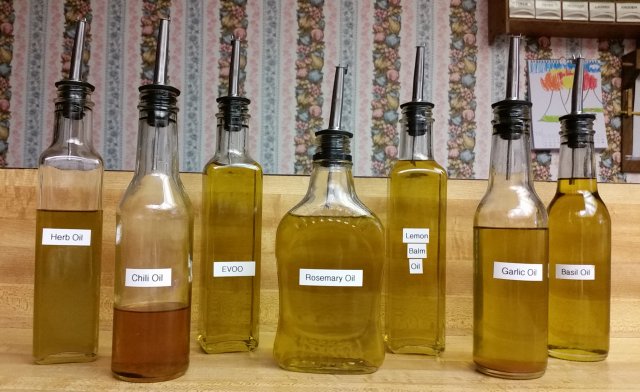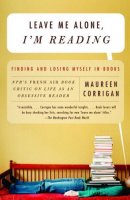 Leave Me Alone, I'm Reading: Finding and Losing Myself in Books by Maureen Corrigan (Vintage Books/Random House, 2005)
Leave Me Alone, I'm Reading: Finding and Losing Myself in Books by Maureen Corrigan (Vintage Books/Random House, 2005)
For a book with such a promising title, there was surprisingly little I could identify with here. I was expecting something lighthearted about introverts, but it's much more personal and introspective and has nothing to do with introverts, per se. The author is a self-professed leftist, feminist college professor who reviews books for NPR's Fresh Air show and is "ambivalent about the constraints of family and community." In other words, other than a love of books, we don't have a lot in common. That doesn't mean her book can't be interesting, but it was depressing, and if I want that, I can go to Facebook.
Given all the books Corrigan has read, and all the books I've read (though I can't hold a candle to her consumption), we have surprisingly little intersection. Before starting the book I skimmed the recommended reading list in the back, and most of the books I've never heard of, let alone read. However, a (very) few items on the list had the merit of not only being books I love, but ones that most other people I know don't share with me: Dorothy Sayers' Gaudy Night and The Nine Tailors, and Marie Killilea's Karen and With Love from Karen. That's about it. What kept me going past the first chapter, which I did not like at all, was my eagerness to see what she thought of these favorites of mine.
As it turns out, we may have read (and loved!) the same books, but we sure didn't read them the same way. Truly, what one gets out of a book depends much on what one brings to the experience. Reading Leave Me Alone, I'm Reading was a vivid reminder of why I hated English class in high school, and why I majored in math in college. Maybe the authors did mean all the weird things that literature teachers pull out of their stories, but if so, I don't really want to know about it. (The only exception I can think of is Michael Ward's Planet Narnia, which I'm fairly certain Corrigan has not read.)
Still, a few quotes stand out.
I learned ... about the void that all devoted readers dread—the void that yawns just past the last page of whatever good book we're currently reading.
With this, I identify completely. I usually start planning my next book before finishing the current one.
More puzzling still is the mystery of what happened to Kingsley Amis himself after writing his masterpiece. Amis transformed from an Angry Young Man to a club-going, Merrie Olde England Tory bag of wind. How can such things be? Similar invastion-of-the-body-snatchers-type conversions besmirch literary history: the defection of New York Intellectual Norman Podhoretz to the right; the mutation of progressive reporter Joe Klein, who had written a moving boigraphy of Woody Guthrie, no less, into a centrist pundit and author of the anonymous Clinton parodic novel Primary Colors. Why? Why? Why? If reading good books doesn't necessariy make you a better person, apparently neither does writing them.
There's only so much of that I can stand. This is the same attitude that cost Hillary Clinton the election. Even if you really do think of half your potential audience as Deplorables, it's rarely good policy to say so out loud.
One of the great pleasures of writing book reviews is that I get to say what I think when I also have the time and space to say it right. Nobody interrupts or intimidates—it's just me and my computer. But I'm much more comfortable voicing my opinions, especially the controversial ones, in print than in person.
Me, too on that one.
Corrigan, who calls herself a "skeptical Catholic"—I would say very skeptical, and that her Catholicism owes more to culture than to belief—finally marries, despite some ambivalence.
It now seems quaint, but one of the big obstacles to matrimony ... was that Rich is an atheist Jew and I am a Catholic, sort of. My parents were upset. ... Richard's parents were also unhappy.
It seems "quaint" to Corrigan that her parents were worried about a marriage starting out with the two parties in disagreement on the very basic bedrock of truth? Despite their different labels, apparently they do agree: on the idea that the truth about the nature of the universe matters a lot less than the fact that they both value books and solitude. But that sort of tolerance is no excuse for thinking you're a liberal, progressive person, enlightened and open-minded—it just means you don't care much about the issue. I'm certain Corrigan would not have married a Republican, because that represents a difference that matters to her.
In the opening scene, a scruffy bunch of Irish Catholics, family and friends, are sitting around a restaurant in Queens. Every time the waitress comes by to fill their water glasses or put down a plate, people at the table quickly say "Thank you." I find myself doing that, too—scrupulously thanking anyone in a restaurant or store who's serving me. It's a holdover from the world of my childhood where we were taught to feel gratitude for any service done for us—and where all the parents we knew held down blue- or pink-collar jobs, so there was no sense of superiority to someone working as, say, a waitress. These days, I sit at too many restaurant tables with people oozing privilege who barely acknowledge the waitperson.
No. This is not a "class" difference. My father was an engineer and my mother a mathematician, and we also were taught to feel (and express) gratitude for service done. Not that we had much chance of trying it out on waitresses, since eating out was not in the budget except on vacation and not often even then. But the lesson was clear, by precept and example, and I still say "thank you" when the waiter fills my water glass or brings my dinner. Common courtesy is not a mark of lower class subservience, and its lack is not "privilege"—it's just rudeness.
Literature doesn't work on readers in predictable ways. Sometimes we readers put up with views we don't like in a novel or any other kind of art in exchange for other compensations.
Indeed. If I rejected every book with what I see as serious flaws, my reading list would be mighty short. But even though I don't regret reading it, Leave Me Alone, I'm Reading did not provide sufficient compensation to justify its continuing to take up bookshelf space.
Except for the title: that's a keeper.
Quiz: How well can you tell factual from opinion statements?
This isn't one of those silly Facebook quizzes, like the one that purports to tell you what voice part you should sing based on personality questions—the one that told me I should be singing low bass. It's from the Pew Research Center, and consists simply of 10 political statements for you to classify as factual or opinion. I thought they were all obvious and scored 5/5 on the factual statements and 5/5 on the opinion statements. Alas, the "nationally representative group of 5,035 randomly selected U.S. adults surveyed online between February 22 and March 4, 2018" did not do so well: only 26% had a perfect score on the factual part, and 35% on the opinion section.
If you take the quiz (which does not require an e-mail address, signing in, or anything else intrusive), you'll get to see not only your results but a breakdown of the people who answered each particular question correctly, based on political party affiliation and how much they trust national news organizations. The first is particularly interesting, if somewhat depressing. Unfortunately for partisans, there's no evidence that Democrats are smarter than Republicans, or vice versa. Sometimes one party fared better, sometimes the other. What is clear is that both parties have a strong tendency to label statements consonant with their own beliefs as fact, and statements that they disagree with as opinion. This despite the clear instructions:
Regardless of how knowledgeable you are about each topic, would you consider each statement to be a factual statement (whether you think it is accurate or not) or an opinion statement (whether you agree with it or not)?
What I find find disturbing is the apparently lack of understanding that a statement of fact can be wrong. "I have red hair" is a statement of fact—one that happens to be false. So is "I like to eat liver" (also false). The latter statement is factual, not opinion, even though it states my opinion of the taste of liver. "Liver is disgusting" is an opinion statement, and my agreeing with it does not make it factual.
It seems we have carried "I'm right, you're wrong" to a whole new level.
I don't need to agree with Elizabeth Warren to recognize that she doesn't deserve all the grief she's getting for celebrating her Native American ancestors. Not from President Trump, not from the Republicans, not from the Democrats, and not even from Native Americans themselves.
Warren's memory of family stories is that somewhere among her forebears were some Native Americans. As a genealogist, I know that this is a fairly common family mythology, and that most of the stories turn out to have no basis in fact. Porter's family had just such a story about "our Indian ancestor," but I've found nothing to back that up in any of my extensive research. (That's okay; he has plenty of other interesting ancestors.)
Donald Trump mocked Warren for this claim, and challenged her to back it up with DNA testing. Recently she released the results: it's likely that somewhere, several generations back, she did indeed have Native American ancestry (from North, South, or Central America). More specific than that can't be said.
But now everyone is jumping on her, from the President to speakers for the Native American communty (not that they all agree), from the Left to the Right. The ancestry, if it exists at all, is too far back to count, they say. Tribal identity is not determined by genetics.
The report states that Elizabeth Warren's most recent Native American ancestor is six to ten generations back. According to many, that makes her heritage insignificant.
As far as I have been able to determine in my research, my own most recent immigrant ancestor is five generations back; most are ten or even more. All of my parents, grandparents, great-grandparents, and great-great-grandparents were native-born Americans. So were all but two or three of my 32 great-great-great-grandparents. Beyond that, the data is not complete, but the percentage of native-born great-great-great-great-grandparents is at minimum more than 50%, and most of them were born before the United States even existed. If ancestors that far back don't count, does that make me Native American?
Of course not. And if Elizabeth Warren's Native American ancestry starts back six to ten or even more generations, it's still her own ancestry. Even if her DNA results had come back negative, it's still quite possible that her ancestry includes Native Americans, because the random recombination that happens from generation to generation means that you have ancestors who didn't give you any of their genes. Genetics isn't genealogy, and genealogy isn't genetics. Your great-great-grandfather is still yours, even if his genes aren't.
So what does this mean for Elizabeth Warren? Can she expect preferential treatment because of her Native ancestry? No, nor as far as I know, has she asked for it. Can she claim membership in a particular, modern tribe? Again, no. Even if the DNA test were tribe-specific, which it is not, qualifications for tribal membership are not based on DNA tests. Again, I believe she has not asked for any such thing.
But to celebrate one's ancestors and ancestral heritage, no matter how small? That's everyone's right. The current government of the Netherlands has no reason to grant me citizenship, but they can't deny my Dutch 9th-great-grandfather, and visiting Holland this summer was a bit more special because I know he existed. Similarly, England, Ireland, Scotland, Wales, Germany, and France hold a special place in my heart because of my ancestral roots. Should I not feel a special thrill standing on English soil because it has been three and half centuries since my English ancesors crossed the Atlantic?
I will celebrate my heritage, no matter how far back. I will also feel connected to Australia, Brazil, Japan, New Zealand, The Gambia, and any other country I have been privileged to visit, even if we have not a single gene in common. I will enjoy their cuisine and their culture, take an interest in their history and politics, and care about their people. If this be treason, I'll make the most of it.
Go, Ms. Warren! Celebrate your heritage and let the chips fall where they may.
Permalink | Read 1427 times | Comments (0)
Category Random Musings: [first] [previous] [next] [newest]
Unlike most of my friends, I did not grow up fantasizing about getting married and having children. My fantasies were more inspired by the books I read: becoming a research scientist, an explorer, or a detective; flying an airplane, fighting for an important cause, having adventures. My mother thought this peculiar, and at one point asked me, "What's wrong with our family that you don't want to have one of your own?"
She had completely missed the point. Why should I want to do that? I already had the perfect family. In her defense, I had not actually verbalized my thoughts, which were more gut-level than reasoned out. But why would I want anything different?
Eventually I caught on to the fact that life doesn't remain static, and part of the purpose of a family is to reproduce itself, albeit in a theme-and-variations sort of way. I might still have missed out, though.
When we married, our friends thought the timing peculiar, since it was in the dead of winter and the groom was still a few months away from graduation. They wondered if perhaps I was pregnant—which was decidedly not the case.
To this day, I don't know why we were in such a hurry to get married—but the young, as a rule, are not particularly patient. However, there's a very good reason why I'm grateful for the timing: three months later my mother died, suddenly and unexpectedly. Not only would she have missed the wedding, but I might have succumbed to the temptation to quit my job and move back home to help my father and three much-younger siblings. And then life would have taken a decidedly different turn.
Who knows? That probably would have turned out to be good, too. But from where I stand now, it's unthinkable, because it would have been without the people who taught me that motherhood wraps up most of my childhood fantasies into one glorious package: being a research scientist, an explorer, and a detective; fighting for important causes, and having incredible adventures. I haven't yet flown a plane, but I'm okay with that.
All this rumination is prelude to wishing one whose entry into this world changed our lives forever a very Happy Birthday! (I also wish we could be there to hear the handbells ring and taste the chocolate mousse.)
Permalink | Read 1635 times | Comments (1)
Category Children & Family Issues: [first] [previous] [next] [newest]
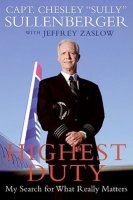 Highest Duty: My Search for What Really Matters, by Chesley "Sully" Sullenberger with Jeffrey Zaslow (William Morrow/HarperCollins, 2009)
Highest Duty: My Search for What Really Matters, by Chesley "Sully" Sullenberger with Jeffrey Zaslow (William Morrow/HarperCollins, 2009)
It's not often I like a movie better than the book it's based on (The Martian is the only one that comes immediately to mind), but in many ways that's true of the story of Captain Sullenberger's amazing landing of USAirways' Flight 1549 on the Hudson River. Sully, the movie, shows excellence of craftsmanship that's lacking in the book. Not surprising—Sullenberger is a pilot, not a writer. Nonetheless, Highest Duty is well worth reading and contains much important information not relevant to (and therefore not included in) the movie.
January 15, 2009. It's hard to realize how unconnected we were back then. We were caught up in our own lives—having just returned from our daughter's wedding in Switzerland—and I missed the event completely; at least, I have no memory of it. We owned a television set, but it was rarely turned on, and we were much more likely to be listening to CD's than to the radio. Porter was on the road, in Arizona I think, and while I'm sure he was aware of the incident, it didn't make the list of important topics to cover in our daily phone call. Today, I'm still pretty unconnected to news when it comes from television or radio, but if anything big happens, I can count on my friends on Facebook to start talking about it, and plenty of internet sources to flesh out their stories. I can (and frequently do) ignore the stories that are currently causing the world to buzz, but I can't miss them.
What I enjoyed most about Captain Sullenberger's story were the glimpses into what makes it possible for me to walk onto an airplane in one city and walk off, a few hours later, in another. These are woven in and out through the book, and the picture that emerges is both awe-inspiring and frightening. I've always felt safer in a plane than in a car, and statistically that's correct. Still, without feeling any less unsafe in a car, I'm a little more nervous about air travel than I was before reading Highest Duty.
People have incredibly high expectations for airline travel, and they should. But they don't always put the risks in perspective. Consider that more than thirty-seven thousand people died in auto accidents in the United States last year. That was about seven hundred a week, yet we never heard about most of those fatalities because they happened one or two at a time. Now imagine if seven hundred people were dying every week in airline accidents; the equivalent of a commercial jet crashing almost every day. The airports would be shut down and every airliner would be grounded.
Sullenberger is no complainer, and this is not the focus of his book. But the picture that emerges is of an airline industry in trouble, and I don't think it's gotten much better since 2009. He blames a lot on airline deregulation, but as I wrote in my previous post, the negative changes that have come to the airline industry are widespread throughout most industries and organizations. Some changes are technological, and many are societal.
A lot of people in the airline industry, and especially at my airline, US Airways, feel beaten down by circumstance. We've been hit by an economic tsunami. Some people feel their companies have held a gun to their heads, demanding concessions. We've been through pay cuts, givebacks, downsizing, layoffs. We're the working wounded.
People get tired of constantly fighting the same battles over and over again every day. The gate agent hasn't pulled the jetway up to the plane in time. The skycap is supposed to bring the wheelchair and hasn't. (I've helped more than a few older people into wheelchairs and pushed them into the terminal myself.) The caterer hasn't brought all the first-class meals. Catering companies always seem to be the lowest bidders with the highest employee turnover. At the end of a long day, you and your crew will get off the plane and make your way out of the terminal, but the hotel van isn't there when it's supposed to be.
All of this stuff beats you down. You get tired of constantly trying to correct what you corrected yesterday.
Many pilots and other airline workers feel that if they keep picking up all the slack, those who run the companies we work for will never staff the airlines properly, or do the training necessary, or hire the contractor who will be more responsible about bringing wheelchairs. And my Colleagues are right about that. In the cultures of some companies, management depends heavily on the innate goodness and professionalism of its employees to constantly compensate for systemic deficiencies, chronic understaffing, and substandard subcontractors.
At all airlines, there are many employees, including in management, who care deeply and try to make things better. But at some point, it can feel like a fine line between letting passengers fend for themselves and enabling the airline's inadequacies.
In my parents' generation, there was an unspoken agreement between big companies and their employees, at least at the level at which my father and his friends worked (somewhere between union workers and management): the employees would be hard-working and loyal, and the company would provide a decent salary, good benefits, a reasonable amount of job security, and a pension one could live on after retirement. That changed for my generation, and if the next generation seems deficient in the hard-work-and-loyalty department, it is good to remember that in their formative years many of them saw that the reward for such behavior looked an awful lot like betrayal.
It's fashionable to disparage "Millennials," by which most people seem to mean not people born between two specific years, but "the current crop of lazy young adults with no ambition, few skills, and a pathetic work ethic." Interestingly, the glimpse I have into the lives of actual people who would otherwise fit into that demographic shows them to be among the hardest-working and most dependable people I know, with very admirable skill sets. It is as if they are trying to make up for those who give the generation a bad name. And the bad apples do exist in high numbers, at least if my conversations with employers and teachers are accurate.
One young employee approached an evaluation convinced that she deserved a raise. When asked why, she responded not with a list of her accomplishments for the company, but with the assertion that she showed up for work every day. Which may be less astonishing than it sounds, given that her boss's complaint about the girl's co-workers was that they didn't show up much of the time.
Apparently the National Guard is authorized to send the police after its recruits that don't show up when expected. But in one town I heard about the Guard is trying to find another approach, since there aren't enough police to deal with the large numbers of no-shows.
Do you want someone with so little sense of responsibility sitting in the pilot's seat on your next flight?
Then there's the matter of experience. It is clear that what enabled Captain Sullenberger to take the actions that saved the life of every single person on board his airplane was a lifetime's worth of intense aviation experience. The older generation of pilots often had military backgrounds, and had put in an enormous number of flight hours before becoming commercial pilots. This included extensive training designed to hone their responses to dangerous, emergency situations. Military pilots still often transition to commercial piloting—I know a Southwest pilot who did just that—but with military cutbacks, civilian flight training is becoming more common, and pilots are graduating with many fewer hours of experience under their belts. Plus, I'm certain they don't get the kind of emergency experience the military pilots do: such training is dangerous—some pilots always die. The risk is necessary for the military, but can a civilian organization take those chances?
Technology, and the availability of simulators for training can probably do a lot to mitigate the situation. There is no substitute for real-life experience, but maybe pilots will do as well—or better—with a percentage of the hours done in the new forms of training. And automation can reduce some pilot error; we're told that in most situations driverless cars make better decisions than live drivers do. On the other hand, there are those other situations—the kind that leave you choosing to land in the middle of a river.
Automated airplanes with the highest technologies do not eliminate errors. They change the nature of the errors that are made. For example, in terms of navigational errors, automation enables pilots to make huge navigation errors very precisely.
Me? I'm not about to stop flying, but I'll do it with more respect and appreciation for those who make it possible. And I'm counting on those ambitious, talented, hard-working, and enthusiastic Millennials that I know are out there to continue to pick up the slack and do the right things. And then move into management and do the right things there, too.
Big things matter. Ask an employee what he wants from his employer, and you'll likely—and rightly—hear about salary, benefits, and a workplace that is physically and emotionally safe. He probably won't think the little things are worth mentioning, but businesses need to be more aware that small investments in employee relations often have a disproportionately large impact.
Back in the days when long-distance telephone charges were a significant item in a family's budget—I know that for many people that sets the time back in the Civil War, but it wasn't—one of the benefits we enjoyed from Porter's job with AT&T was a $35/month credit for long-distance services. In strict financial terms, it was a pittance, and hardly could have made much of a difference to the bottom line of such a big company, but what it bought in feelings of goodwill toward AT&T on the part of its employees' families made it one of their better investments.
When corporations start feeling a financial pinch, however, those whose job it is to find ways to save money do not always see the whole picture.
I'm currently reading Highest Duty (by Captain Chesley "Sullly" Sullenberger and Jeffrey Zaslow; thanks, DSTB!), the book on which the movie Sully is based. This is not a review, though I will say that so far I'm enjoying the book. But one incident haunts me, unexpectedly.
Captain Sullenberger was a pilot for USAirways, but I've no doubt that with all the financial problems of the industry, other airlines were and are no better. Indeed, the financial story is true for industries across the board, and mirrors the experiences we had with AT&T and IBM. Pilots' salaries were slashed, and their pensions gutted—but that's not what haunts me. It's the peanut butter and jelly sandwich.
Airlines once provided their pilots and flight attendants with free meals on long-haul flights. A small enough service, surely! But that, too, was cut, and Sullenberger began brown-bagging his lunches. Ask a pilot his priorities, and safety, salary, and benefits will top the list. But we should never underestimate the corrosive power of eating a peanut butter and jelly sandwich whilst inhaling the scents of beef tenderloin that waft in from First Class. Providing a few extra meals on long flights would seem a prudent investment in employer-employee relations, with the potential return in good will and good feelings disproportionately high compared with the cost.
I can't change corporate culture, but I wonder: What small investments of our time, money, and attitudes can we, as individuals, make that carry the potential for high return in someone else's life?
Permalink | Read 1481 times | Comments (0)
Category Random Musings: [first] [previous] [next] [newest]

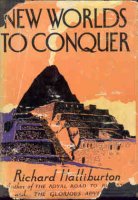 The Glorious Adventure by Richard Halliburton (Garden City Publishing, 1927)
The Glorious Adventure by Richard Halliburton (Garden City Publishing, 1927)
New Worlds to Conquer by Richard Halliburton (Garden City Publishing, 1929)
Last year I reviewed Richard Halliburton's The Royal Road to Romance. I read The Glorious Adventure soon thereafter, and finished New Worlds to Conquer just now.
In The Glorious Adventure, Halliburton describes his efforts to recreate The Odyssey, following the trail of Homer's hero, Ulysses. New Worlds to Conquer is set in Latin America, from Mexico to Argentina, and is my favorite of the three, probably because it is the only one I remember reading as a child. I'm not good at remembering the content of books that I've read, and the rest of New Worlds was foreign to me on re-reading, but I've never forgotten that Halliburton swam the Panama Canal from one ocean to the other, including through all the locks. I particularly remembered that when asked how he proposed to meet the lock fees, he replied, "Just as the other ships meet it, sir. I'd pay according to my tonnage." It cost him thirty-six cents.
There is an inscription in New Worlds to Conquer indicating that it was a gift to my father from his parents. I wonder how young he was when he received it; he was eight years old when it was published.
What I wrote about The Royal Road to Romance is equally true here.
Halliburton's life is not one to be emulated—he died at 39 attempting to cross the Pacific in a Chinese junk—and his stories have a light-hearted amorality about them that can be a little disconcerting, as can the racial attitudes and language of the time. But understood in context, I think this would be a good book for older grandchildren.
There is a good deal of history, geography, and literature woven throughout Halliburton's books, but the educational value does not detract; indeed, it adds much to the adventures. And adventures they are. Halliburton is a poster child for what can be accomplished through guts and gall. A man who doesn't hesitate to throw himself 70 feet into the Mayan Well of Death at Chichen Itza—twice—and voluntarily gets himself incarcerated with France's most notorious prisoners in its even more notorious prisons off the coast of French Guiana, is not likely to live a long life. Halliburton lived only four years longer than Mozart, but like the composer, his accomplishments in those years were prodigious.
I wonder what the Richard Halliburtons of today are doing? The world was looser back when he had his adventures. From Angkor Wat to Machu Picchu, he climbed all over the wonders of the world, and experienced them in solitude. Now there are fences, and guards, and rules—and a very good thing, too, given the hordes of tourists who now descend. But the discovery of Machu Picchu was less than 20 years old when Halliburton visited, and very few tourists would go through what he did to get there.
A careless disregard for personal safety, a rejection of traditional responsibilities, a burning internal drive, and a charming personality can be a recipe for a totally selfish life. But timid folks like me are awed by how much such boldness can achieve.
For those of you who think I'm just a classical music snob....
I don't remember where I came across this beautiful country song—odds are it was somewhere on Facebook—and I hesitate to share it, since embedded YouTube videos are no longer working for me. But you can click on the image to hear John David Anderson's haunting Seminole Wind. (That's fixed now; see below. I've also made minor changes to the lyrics transcription.)
It's a song to tear at the heart of a Floridian, even a semi-native such as I. In addition to all the other emotions it evokes, it takes me back to the days when the YMCA wasn't ashamed to call its Parent-Child programs "Indian Guides" and "Indian Princesses." Now it's "Adventure Guides" and the Native American connection is lost. Back then, the Florida Indians—who at that time preferred "Indian" to "Native American"—welcomed the Y tribes to their own pow-wows. I can still hear the drums, the voices, and the prayers, and taste the fry bread....
Not to mention that a love of wilderness areas was bred into my bones, whether New York's Adirondacks or Florida's wetlands, scrubs, and hammocks.
And I'm a sucker for Dorian mode.
Ever since the days of old,
Men would search for wealth untold,
They'd dig for silver and for gold,
And leave the empty holes.
And way down south in the Everglades,
Where the black water rolls and the saw grass waves,
The eagles fly and the otters play,
In the land of the Seminole.
So blow, blow Seminole wind,
Blow like you're never gonna blow again.
I'm callin' to you like a long-lost friend,
But I know who you are.
And blow, blow from the Okeechobee
All the way up to Micanopy.
Blow across the home of the Seminoles,
The alligators and the gar.
Progress came and took its toll,
And in the name of flood control,
They made their plans and they drained the land,
Now the Glades are goin' dry.
And the last time I walked in the swamp,
I sat upon a cyprus stump.
I listened close and I heard the ghost
Of Oseola cry.
So blow, blow Seminole wind,
Blow like you're never gonna blow again.
I'm callin' to you like a long-lost friend,
But I know who you are.
And blow, blow from the Okeechobee
All the way up to Micanopy.
Blow across the home of the Seminoles,
The alligators and the gar.
Songwriter: John David Anderson
Seminole Wind lyrics © Universal Music Publishing Group
Here's the video now; thanks to Lime Daley for fixing my problem.
Many of my friends are long-time fans of extra virgin olive oil, or EVOO as they call it. I've felt the pressure to use this "healthy" oil, but had always dragged my feet. Olives, to put it plainly, nauseate me. It would be much more convenient if I liked them, but I don't.
Nonetheless, over the span of a year or so I was able to train myself to tolerate EVOO. Then in 2016 I discovered the oil from California Olive Ranch, which not only passed the tests of quality and freedom from Italian Mafia interference (I hope that's still true), but tasted great. I've never looked back.
I've moved forward, too. Combine my new love of EVOO with an overflowing herb garden and the desire to not waste its bounty, and you get this:
Making an olive oil infusion is easy and fun. I clean the herbs, put them in a bottle, and pour EVOO on top. The bottles you see here are not the ones I use to make the infusions, which have larger mouths. After a few days, I strain the oil into the dispenser bottles. These bottles are some I had on hand (previously holding oil, vinegar, even maple syrup), chosen for neck sizes that would fit my pourers, which are Cuisenart, purchased from Bed, Bath, and Beyond.
For the garlic oil, I tried crushing the cloves for one batch, and chopping them for the next. I think I prefer chopping, despite the smaller surface area, because it makes the oil less cloudy—though still not as clear as the other varieties.
Our jalapeño crop did not come through this year, but the chili oil came out just fine using dried red pepper flakes.
The one herb you might not be familiar with is lemon balm. I started out with a small batch, because I didn't know how I'd like it. It has turned out well, adding a brightness to food without increasing acidity.
The bottle labeled "herb oil" is a mixture of rosemary, basil, oregano, lemon balm, garlic, and peppercorns (this time; it will be different as the garden changes). No particular quantities, just what came from trimming our plants. It's wonderful as a dip for good bread. I suspect that with some balsamic vinegar it would also be lovely on a salad.
All the oils have been great to have on hand for cooking. I would say my efforts to embrace extra virgin olive oil have paid off handsomely.
I thought my success might make me more favorably inclined to olives themselves, but that goal still eludes me.
It's official: our church has a new rector, Father Trey Garland. He's from Texas, so I assume he's up for a big job: taking over for a popular retiring priest without splitting the church. Our church in Massachusetts, which ended its 18-month-long search for a new rector just as we moved back to Central Florida, suffered just such a split. Some would say we took the coward's way out, figuring that quitting one's job, tearing up the family's roots, and moving 1300 miles is preferable to having one's church blow apart. They have a point.
Our current church is not an easy church to pastor, being both highly diverse and highly opinionated in our religious and political views. On the other hand, we do manage to love, respect, and care for each other while working together to get the job (whatever it is) done—a trick our country could learn.
Besides, I have high hopes for Father Garland: he plays the bagpipes. No joke. He went to college on a bagpipe scholarship.
We learned the identity of our new rector on Sunday, and—because I have a reputation as The One Who Looks Things Up—our choir director said he expected me to have a full report Monday morning. He was joking, but that's what I do. I look things up. Our children quickly learned that there was no need to consult the dictionary or an encyclopedia with a question: just ask Mom, and she won't be able to rest until she finds the answer. (I'd say, "look it up," and they'd say, "I don't want to know that badly," and eventually I would look it up myself, because I wanted to know that badly.) There are some people, of course, who find this behavior annoying. My sister-in-law has learned not to idly wonder how tall the Eiffel Tower is, for example, when we're in the middle of playing a game, because I will not rest until I've looked up the answer, even if it is my turn. To me, "idly wonder" is an oxymoron.
That said, I'm a bit peculiar in what I choose to wonder about.
Believe me, I take the situation of having a new rector very seriously. There are many issues that matter, issues that have split churches and driven long-time, faithful, hard-working pillars of the church away. When asked in a church survey what questions I would like to ask a candidate for the position of rector, my suggestions were along the lines of, Who is Jesus? How do you view the authority of the Bible? Of Church history and tradition? How do you promote grace, mercy, and compassion without compromising truth or condoning sin? What is your view of families with young children worshipping together in the service? Do you think we should reshape the worship service to be more attractive to young people? What is your philosophy of music as it relates to worship? What is your vision of the church's role as a member of the community? What is your vision of missions and outreach?
The answers to these questions I await with fear and trembling. But my actual research? Priorities, you know! Here's what I've learned:
I have it on the highest authority (the world-renowned piper who played for Heather and Jon's wedding) that the bagpiping program at our new rector's alma mater is highly respected, and we should encourage Father Garland to make piping a regular part of the service.
I'd settle for Christmas and Easter. And maybe the weekend of the Highland Games.
Permalink | Read 2478 times | Comments (1)
Category Everyday Life: [first] [previous] [next] [newest]
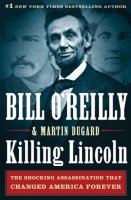
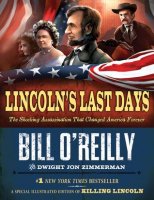
Killing Lincoln: The Shocking Assassination That Changed America Forever by Bill O'Reilly and Martin Dugard
Lincoln's Last Days: The Shocking Assassination That Changed America Forever by Bill O'Reilly and Dwight Jon Zimmerman
Six years is a long time to hold a debt, and I consider a gift book unread to be a debt unpaid. But my father-in-law, who so kindly gave us both of these books for Christmas 2012, is not alone among our creditors. Most Americans have credit card debt; I have bookshelf debt. These shelves in my office are only representative, by no means comprehensive. But I plow on, one book at a time.
Or in this case, two books. Lincoln's Last Days is really a much-shortened version of Killing Lincoln, with the addition of many illustrations. To me, this makes Killing Lincoln the far more interesting book. With apologies to the world's illustrators, I rarely appreciate their work. Pictures are great in their place, but to my mind their place is rarely to be cluttering up a book. They annoy me by interrupting the flow of the words, and by breeding conflict: I want to keep reading — I really ought to look at the pictures — but they always break my train of thought — if I skip the pictures can I really say I've read the whole book? — does it count if I give them a cursory glance? — ugh. I often don't even look at the illustrations in children's picture books when I read them to our grandchildren, another reason I dislike the modern trend of not including the whole story in the words alone. You can guess how I feel about those books that don't have any words at all!
But this isn't about my quirks. And I'll admit that the shortened, illustrated version was a good gateway book for me. I'm not above letting prejudice affect my actions, and I had an unreasoned, gut-level prejudice against Bill O'Reilly. I say unreasoned because I knew nothing about him, had never seen him, had never heard him except accidentally in the background. But what I had soaked in from the world around me was negative. And I had noticed that he seems to have a predilection for writing about killing people: Killing Lincoln, Killing Patton, Killing Reagan, Killing Kennedy, Killing Jesus, Killing England, etc. Which left me with a bad taste in my mouth for reading anything of his. Okay, maybe this really is about my quirks.
However, since 2009, when I wrote Finding Truth in Unexpected Places, I have encountered more examples than I can count of my (then) newly-made proverb, the wise man recognizes truth in the words of his enemies. Not that Bill O'Reilly is my enemy, but you get the idea.
Much to my surprise, I greatly enjoyed both books.
Perhaps someone who knows more about Abraham Lincoln and the Civil War would not be as impressed, but I learned a lot. What's more, the stories are well-written and gripping and I found it hard to put the books down, even though I knew how they turned out. There are a few minor annoyances, such as some of the physical descriptions, e.g. "Laura Keene steps aside. She can't help but marvel at Lincoln's upper body, still possessing the lean musculature of the young wrestler renowned for feats of strength." This, while Lincoln was dying in her presence? Was that really necessary? Not to mention the use of "can't help but," a pet peeve of mine.
If you want to feel good about human nature, this might not be what you're looking for. We don't seem to have progressed much from the mid-19th century, when people celebrated by drinking and rioting, mourned by drinking and rioting, and protested by drinking and rioting; when the nation's leaders thought it reasonable to violate the Constitution in the name of security; and when the American people discarded justice—let alone compassion—in favor of vengeance.
There is a lot of interesting detail here, and the books appear to have been well-researched; don't expect much nuance, however. If you have any thought that the Civil War was about more than just slavery, or that Abraham Lincoln was not a saint in every possible way, Bill O'Reilly is not your man. But nuance comes best from reading many sources (or watching—Ken Burns' PBS Civil War series is excellent), and these well-told stories deserve a place in that collection. I highly recommend reading either book, but especially Killing Lincoln. It would be appropriate—and easy reading—for my two oldest grandchildren.
I notice that our local library has many of O'Reilly's other books. Despite my initial prejudices, I'm inclined to check out some of the other people he has "killed." This is another reason why the unread books on our shelves are slow to change their status.


